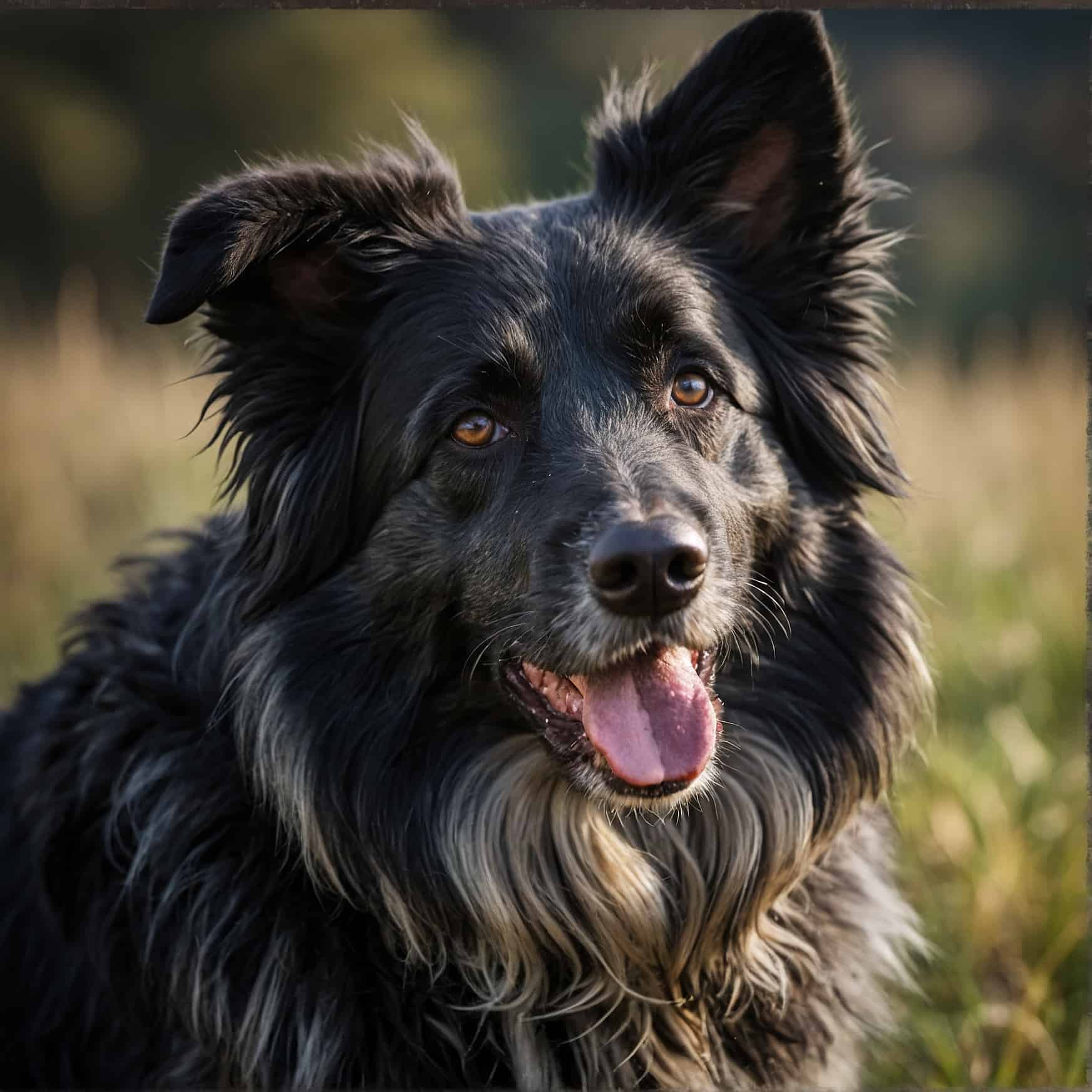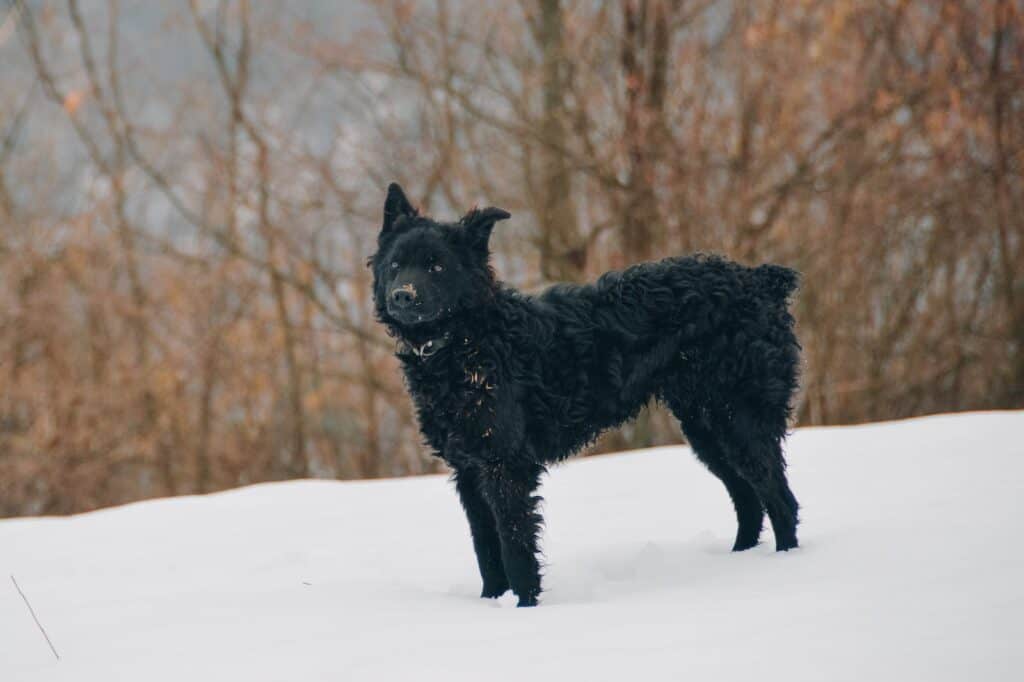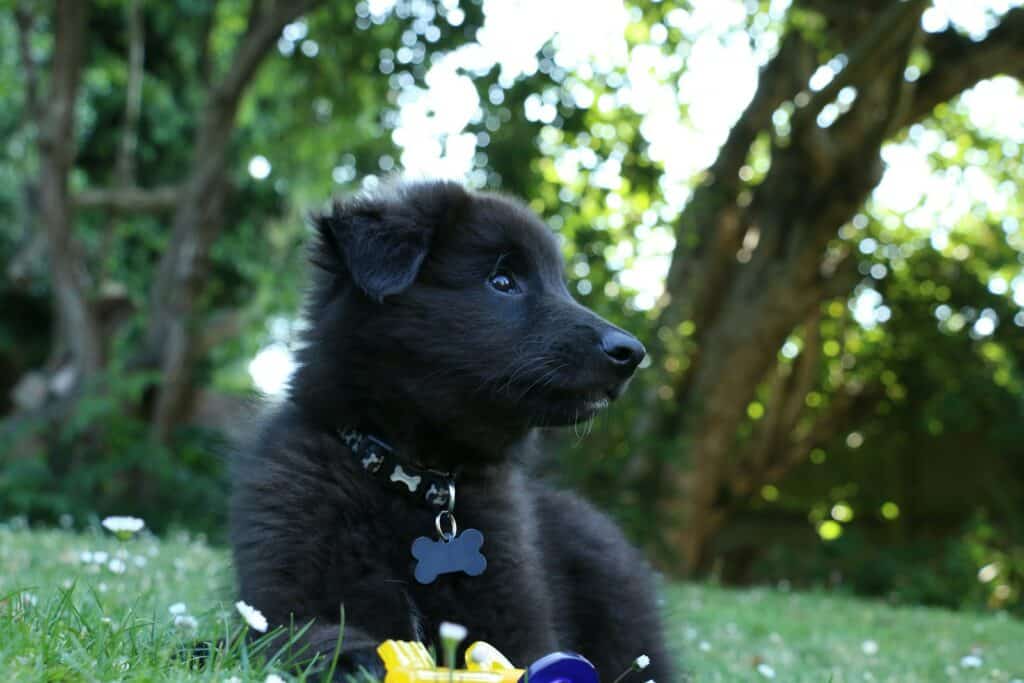The Croatian Sheepdog, an epitome of agility, unwavering loyalty, and remarkable herding skills, has become a treasured choice among dog enthusiasts and farmers. With its Croatian origins, distinctive physical characteristics, and a unique set of personality traits, this breed is revered as an agile and dedicated herding dog with a lively and affectionate disposition.

| Category (Explanation) | Breed Information |
|---|---|
| Year of Breed Conception | Ancient |
| Country of Origin | Croatia |
| Weight (lbs & kg) (Male) | 35-49 lbs (16-22 kg) |
| Weight (lbs & kg) (Female) | 29-43 lbs (13-19.5 kg) |
| Coat Type | Medium-length double coat |
| Color Variations | Black or black with white markings |
| Shedding Level (Low, Moderate, High) | Moderate |
| Height (cm & in) | 16-22 inches (40-56 cm) |
| Breed Size | Medium |
| Trainability (Low, Moderate, High) | High |
| Mental Needs (Low, Moderate, High) | High |
| Intelligence Level (Low, Moderate, High) | High |
| Energy Level (Low, Moderate, High) | High |
| Agility (Low, Moderate, High) | High |
| Loyalty (Low, Moderate, High) | High |
| Playfulness (Low, Moderate, High) | Moderate |
| Exercise Needs | Regular exercise and mental stimulation |
| Guarding Proficiency (Low, Moderate, High) | High |
| Sociability with Children (Low, Moderate, High) | High |
| Barking Level (Low, Moderate, High) | Moderate |
| Digging Tendency (Low, Moderate, High) | Low |
| Destructive Behavior (Low, Moderate, High) | Low |
| Drooling Level (Low, Moderate, High) | Low |
| Obedience Level (Low, Moderate, High) | High |
| Apartment Friendly (Yes/No) | Can adapt to apartment living with sufficient exercise |
| Inherent Prey Drive | Moderate |
| Physical Risk to Others (Low, Moderate, High) | Low |
| Travel Fatality Risk (Low, Moderate, High) | Low |
| Allergen Potential | Low |
| Health Concerns (List of Common Health Concerns) | Hip Dysplasia, Eye Issues, Joint Problems |
| Average Life Expectancy (Life Expectancy in Years) | 12-14 years |
| Croatian Sheepdog: | |
| Category (Explanation) | Breed Information |
| Year of Breed Conception | Ancient |
| Country of Origin | Croatia |
| Weight (lbs & kg) (Male) | 35-49 lbs (16-22 kg) |
| Weight (lbs & kg) (Female) | 29-43 lbs (13-19.5 kg) |
| Coat Type | Medium-length double coat |
| Color Variations | Black or black with white markings |
| Shedding Level (Low, Moderate, High) | Moderate |
| Height (cm & in) | 16-22 inches (40-56 cm) |
| Breed Size | Medium |
| Trainability (Low, Moderate, High) | High |
| Mental Needs (Low, Moderate, High) | High |
| Intelligence Level (Low, Moderate, High) | High |
| Energy Level (Low, Moderate, High) | High |
| Agility (Low, Moderate, High) | High |
| Loyalty (Low, Moderate, High) | High |
| Playfulness (Low, Moderate, High) | Moderate |
| Exercise Needs | Regular exercise and mental stimulation |
| Guarding Proficiency (Low, Moderate, High) | High |
| Sociability with Children (Low, Moderate, High) | High |
| Barking Level (Low, Moderate, High) | Moderate |
| Digging Tendency (Low, Moderate, High) | Low |
| Destructive Behavior (Low, Moderate, High) | Low |
| Drooling Level (Low, Moderate, High) | Low |
| Obedience Level (Low, Moderate, High) | High |
| Apartment Friendly (Yes/No) | Can adapt to apartment living with sufficient exercise |
| Inherent Prey Drive | Moderate |
| Physical Risk to Others (Low, Moderate, High) | Low |
| Travel Fatality Risk (Low, Moderate, High) | Low |
| Allergen Potential | Low |
| Health Concerns (List of Common Health Concerns) | Hip Dysplasia, Eye Issues, Joint Problems |
| Average Life Expectancy (Life Expectancy in Years) | 12-14 years |
| These tables provide information about each of the mentioned dog breeds, including their origin, characteristics, and care requirements. If you need further information or have additional questions, please let me know. |
Woof Mastery is reader supported and our articles may contain affiliate links.
Instead of running third party ads that we have no control of we only use links from high-quality companies we are directly partnered with. Making use of these links come at no cost to you our reader, and in many cases have the extra benefit of discounted rates or sign up bonuses.
If you’re interested you can read more about our affiliate policy here.
We appreciate your support and always insure that the products and services we recommend are high-quality, helpful and relevant to the subject at hand!
The Croatian Sheepdog, known as the Hrvatski Ovčar, has a history as a herding and working dog in Croatia. These dogs have been herding and guarding livestock in the region for centuries.
Their name, “Hrvatski Ovčar,” reflects their Croatian heritage. Croatian Sheepdogs are known for their intelligence and agility in herding tasks.
Today, they are celebrated for their herding abilities and their loyalty as family pets. They embody the spirit of skilled herding dogs in the Croatian countryside.

The Croatian Sheepdog, or Hrvatski Ovčar, is special for its agility and work ethic. These herders have a history of guarding livestock in Croatia. Their loyalty and herding skills make them exceptional working dogs and beloved family members.
Croatian Sheepdogs, or Hrvatski Ovčar, have a tradition as herding dogs in Croatia. Their agility and herding instincts made them skilled at guiding and protecting livestock. They were known for their intelligence and loyalty. Today, they participate in herding and dog sports and serve as cherished family companions, preserving their tradition as reliable working dogs.
Croatian Sheepdogs, or Hrvatski Ovčar, have spirited and adaptable personalities. They excel as herding dogs in Croatia.
Their agility and work ethic make them excellent herders, and they have a loving and loyal nature. Croatian Sheepdogs are characterized by their agility, devotion, and a playful disposition, epitomizing the perfect blend of resilience and companionship.
Croatian Sheepdogs are loyal and protective. They are typically good with children and other pets but may be reserved with strangers. Early socialization is important for a well-adjusted temperament.
Mental and physical exercise is crucial for their well-being.
Croatian Sheepdogs, or Hrvatski Ovčar, are medium-sized dogs with a sturdy and well-proportioned build. They have an expressive head with dark almond-shaped eyes and semi-pricked ears. Their double coat is typically dense and medium in length, often in shades of black or black and tan with white markings. They have a charming and agile presence, reflecting their herding heritage.
Croatian Sheepdogs, or Hrvatski Ovčar, often have a coat in shades of black or black and tan with white markings. They may not have distinct coat colors.
Croatian Sheepdogs, or Hrvatski Ovčar, often have a coat in shades of black or black and tan with white markings without distinct coat patterns.
Croatian Sheepdogs have a low to moderate shedding level. They shed year-round, with seasonal variations. Regular grooming and brushing are important to minimize shedding and maintain their coat.
Croatian Sheepdogs have a medium-length double coat that requires regular grooming. Grooming habits for this breed include:
1. Brushing: Regular brushing, at least once or twice a week, is essential to prevent matting and remove loose fur. Use a slicker brush or a pin brush for grooming.
2. Bathing: Bathe Croatian Sheepdogs when necessary using a dog-specific shampoo and ensure thorough rinsing.
3. Ears: Check and clean their ears regularly with a veterinarian-recommended solution to prevent wax buildup or infections.
4. Nails: Keep their nails trimmed to a comfortable length to maintain proper gait and prevent discomfort.
5. Teeth: Brush their teeth regularly to ensure dental health and prevent bad breath. Dental chews or toys can be beneficial.
6. Tail and Paw Care: Maintain cleanliness in the tail and paw areas, inspecting for any signs of irritation or injury.
Croatian Sheepdogs have a moderate to high activity level and thrive on both physical and mental challenges. Key points about their activity level include:
1. Exercise Needs: Croatian Sheepdogs require daily exercise to stay happy and healthy. Activities can include walks, playtime, and interactive tasks.
2. Energy Level: They have a moderate to high energy level, especially when young. Regular exercise helps prevent restlessness.
3. Herding Heritage: Historically, Croatian Sheepdogs were bred for herding and protecting livestock. They excel in activities like obedience training, agility, and herding trials.
4. Mental Stimulation: In addition to physical exercise, mental challenges through training and interactive games are important to keep them mentally sharp.
5. Family Companions: They make good family pets and enjoy spending time with their human companions.
Croatian Sheepdogs, or Hrvatski Ovčar, are intelligent dogs known for their problem-solving abilities and adaptability. Here are some key points about their intelligence:
Croatian Sheepdogs’ intelligence makes them effective working dogs and cherished companions when provided with proper training and mental stimulation.
Mental Stimulation: Croatian Sheepdogs are intelligent and active dogs. Engage their minds with challenging activities, puzzle toys, and obedience training to prevent boredom and mental stagnation.
Social Interaction: These dogs are social and require regular interaction with their human family members. Loneliness can lead to anxiety, so provide them with companionship and attention.
Exercise: Physical activity is essential not only for their bodies but also for their mental health. Regular exercise helps reduce stress and anxiety in Croatian Sheepdogs.
Training and Obedience: Obedience training is crucial for Croatian Sheepdogs. It provides mental stimulation and strengthens their bond with their owners. Consistent, positive-reinforcement training is effective in shaping their behavior.
Routine and Structure: These dogs thrive on routine and structure. Establish a predictable daily routine to help them feel secure and reduce anxiety.
Affection and Attention: Show affection and spend quality time with your Croatian Sheepdog. They are known for their loyalty and need for human companionship.
Socialization: Early socialization is crucial to help Croatian Sheepdogs become well-adjusted dogs. Expose them to different people, animals, and environments to build their confidence.
Safe Environment: Create a safe and comfortable environment at home where they can relax and feel secure. Provide a designated space for them to retreat to if they need alone time.
Consistency: Consistency in training and daily routines helps Croatian Sheepdogs feel more secure and confident in their environment.
Enter The Woof Mastery

Thinking about a Croatian Sheepdog? Keep these considerations in mind:
1. Activity Level: Croatian Sheepdogs are active dogs that require regular exercise and mental stimulation.
2. Training Needs: They are intelligent and require consistent training and socialization to prevent behavioral issues.
3. Space: Croatian Sheepdogs adapt well to smaller living spaces but need outdoor playtime.
4. Coat Care: Regular grooming is important to manage their coat and prevent matting.
5. Herding Instinct: Be prepared for their natural herding behaviors and tendencies.
Croatian Sheepdogs, known for their herding abilities, may pose a physical risk to others if not properly socialized, trained, or managed. The risk assessment factors include:
1. Herding Instinct: Croatian Sheepdogs have a strong herding instinct, which may lead to chasing or nipping at people or other animals. Proper training is essential to manage this behavior.
2. Socialization: Early and thorough socialization is crucial to ensure Croatian Sheepdogs are comfortable around people and other animals. Poor socialization can lead to fear or aggression.
3. Training: Obedience training is essential to teach Croatian Sheepdogs appropriate behavior and ensure they respond to commands. Well-trained dogs are less likely to engage in aggressive behavior.
4. Owner Responsibility: Responsible ownership involves being aware of the dog’s behavior and taking necessary precautions in public settings.
5. Breed-Specific Legislation (BSL): Croatian Sheepdogs are generally not subject to BSL, but owners should be aware of local regulations.
6. Individual Variability: Each dog is unique, and behavior can vary. Responsible ownership, proper training, and socialization are key to minimizing the potential physical risk to others.
Croatian Sheepdogs are often good with children. They are affectionate and may form strong bonds with kids. Proper socialization and training are important for their interactions with children.
Croatian Sheepdogs can be good swimmers. Their coat colors do not hinder their swimming ability. Many may enjoy being in the water and can paddle. However, always be cautious with their safety in the water and provide close supervision, especially if they are swimming in deep or strong currents.
Remember that Croatian Sheepdog puppies, like all puppies, are eager to please and learn. Positive and consistent training practices will help them become well-behaved, obedient, and happy adult dogs. Building a strong and trusting bond with your puppy through training is a rewarding experience for both you and your canine companion.
Croatian Sheepdogs are typically moderate in terms of noisiness. They may bark to alert their owners to potential threats or unusual activities, but their barking is generally not excessive.
Croatian Sheepdogs thrive in homes that provide:
Challenges:
Traveling with Croatian Sheepdogs involves these considerations:
Croatian Sheepdogs are generally healthy, but they may be prone to certain health concerns, including:
Proper nutrition is essential for Croatian Sheepdogs. Follow these nutritional habits:
Proper nutrition is essential for the health and well-being of Croatian Sheepdogs.
Breed-specific laws (BSL) may affect Croatian Sheepdogs in certain areas, and owners should be aware of these regulations. BSL is typically enacted at the local level, and the restrictions can vary from one jurisdiction to another. Here are some common types of BSL restrictions that Croatian Sheepdogs may encounter:
The rationale for BSL is often based on concerns about public safety and perceived risks associated with specific breeds, including Croatian Sheepdogs. However, it’s important to note that Croatian Sheepdogs are not inherently aggressive, and BSL may affect them due to their physical resemblance to breeds sometimes included in these laws.
BSL is a contentious subject, and many advocates argue that it unfairly targets breeds rather than addressing individual dog behavior. They emphasize that responsible ownership, training, and education should be emphasized instead of breed-specific restrictions.
To determine if there are breed-specific laws or restrictions regarding Croatian Sheepdogs in your area, you should check with your local animal control or government authorities. Be aware of and comply with any local regulations to ensure that you are in compliance with the law while owning a Croatian Sheepdog.
Woof Mastery is reader supported and our articles may contain affiliate links.
Instead of running third party ads that we have no control of we only use links from high-quality companies we are directly partnered with. Making use of these links come at no cost to you our reader, and in many cases have the extra benefit of discounted rates or sign up bonuses.
If you’re interested you can read more about our affiliate policy here.
We appreciate your support and always insure that the products and services we recommend are high-quality, helpful and relevant to the subject at hand!
Myth 1: Croatian Sheepdogs are Always Shaggy
Truth: While they have a shaggy coat, Croatian Sheepdogs can look tidy with regular grooming and maintenance. Their appearance is manageable with proper care.
Myth 2: They are Not Suitable for Families
Truth: Croatian Sheepdogs can be great family pets when properly socialized. They are known for their loyalty and protectiveness.
Croatian Sheepdogs are celebrated for their herding and working abilities, but specific famous individuals of this breed may not be as widely documented. They have contributed to herding and working roles in Croatia and other regions.
Croatian Sheepdogs have been owned and appreciated by individuals and families in Croatia. Notable historical owners may not be widely recognized, but these dogs have a history of herding and working in their native region.
Croatian Sheepdogs, like all breeds, face certain challenges and dangers. Some of the greatest dangers and concerns for the breed include:
By understanding these challenges and providing responsible ownership and care, many of these dangers can be mitigated to ensure the well-being of Croatian Sheepdogs.
The Croatian Sheepdog, known as the Hrvatski Ovčar, originated in Croatia. It was bred for herding and managing livestock. The breed’s development likely included local herding and guardian dogs selectively bred for their herding instincts and adaptability to the region’s terrain.
The Croatian Sheepdog is a breed celebrated for its herding abilities and spirited personality. They excel in herding and companionship roles, winning the hearts of dog enthusiasts with their unique characteristics and affectionate nature.
Being a Croatian Sheepdog owner involves providing mental and physical stimulation, grooming, and regular veterinary care. Responsible ownership includes addressing potential health concerns and nurturing their herding instincts through training.
With their expressive eyes and lively demeanor, Croatian Sheepdogs continue to charm those who appreciate their distinct traits and loyal companionship.